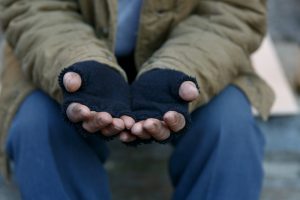Texas Homeless Populations Fight Addiction and COVID-19
COVID-19 is a respiratory disease caused by the novel coronavirus. Currently, the world is grappling with a global pandemic. As nations hurry to adapt their healthcare systems to the influx of COVID-19 patients, they are realizing some populations are more vulnerable than others. Homeless populations are chief on this list, as their lack of access to shelter, healthcare, and struggles with diseases such as addiction have left them particularly vulnerable to COVID-19.
COVID-19, Addiction and Homelessness in Texas

Homeless people are at greater risk for contracting COVID-19. This is mainly due to a lack of access to resources. Housing is the most pivotal. Sleeping on the streets, especially during rainy weather or colder seasons, is bad for one’s immune system. Additionally, homeless shelters can become overcrowded very easily, especially in the Dallas area. The coronavirus can spread easily through venues where many people are crowded together. To make the plight of the homeless more desperate, most do not have access to sufficient healthcare. These are just a few of the reasons why homeless people in Texas are at a heightened risk of contracting COVID-19.
Homeless individuals who struggle with addiction are also at an increased risk of contracting COVID-19. Addiction, especially when it involves substance abuse, can wreak havoc on one’s immune system. Alcohol is bad enough, but drugs that affect the lungs can cause a nightmare for those who get infected with the coronavirus. Substance abuse can also lead one to partake in reckless behavior. These behaviors could include gathering in groups, sharing facilities, and generally ignoring the CDC’s social distancing guidelines. Addiction alone can be devastating. When addiction strikes in tandem with homelessness and COVID-19, it can possibly be a death knell. However, there is believable hope out there, whether you’re struggling with homelessness, addiction, the coronavirus, or some combination of the three.
Treating COVID-19 and Addiction in Homeless Communities
There are many ways to combat homelessness, addiction, and COVID-19 in Texas. Expanding access to housing and healthcare would do a lot of reduce the spread of infection. While this can be difficult, especially considering overcrowded infrastructure, it would cut down on the amount of homeless living in the streets. Meanwhile, giving homeless people with access to healthcare would lead to them getting medical help for COVID-19, increasing their chances of beating the disease.
Treating addiction is another good way to reduce the spread of infectious diseases, such as COVID-19, amongst homeless communities. As stated, addiction can decrease the strength of one’s immune system and lead them to reckless behavior. Treating addiction at its source can decrease these risk factors, and by proxy reduce the spread of infectious disease.
Greenhouse Treatment Center, located in Grand Prairie, remains open and committed to fighting addiction, even during the coronavirus pandemic. Our medically informed, patient-centric treatment program is designed to help individuals conquer addiction and forge a new path in sobriety. Don’t let addiction lead you into despair. A life in recovery is just a phone call away.